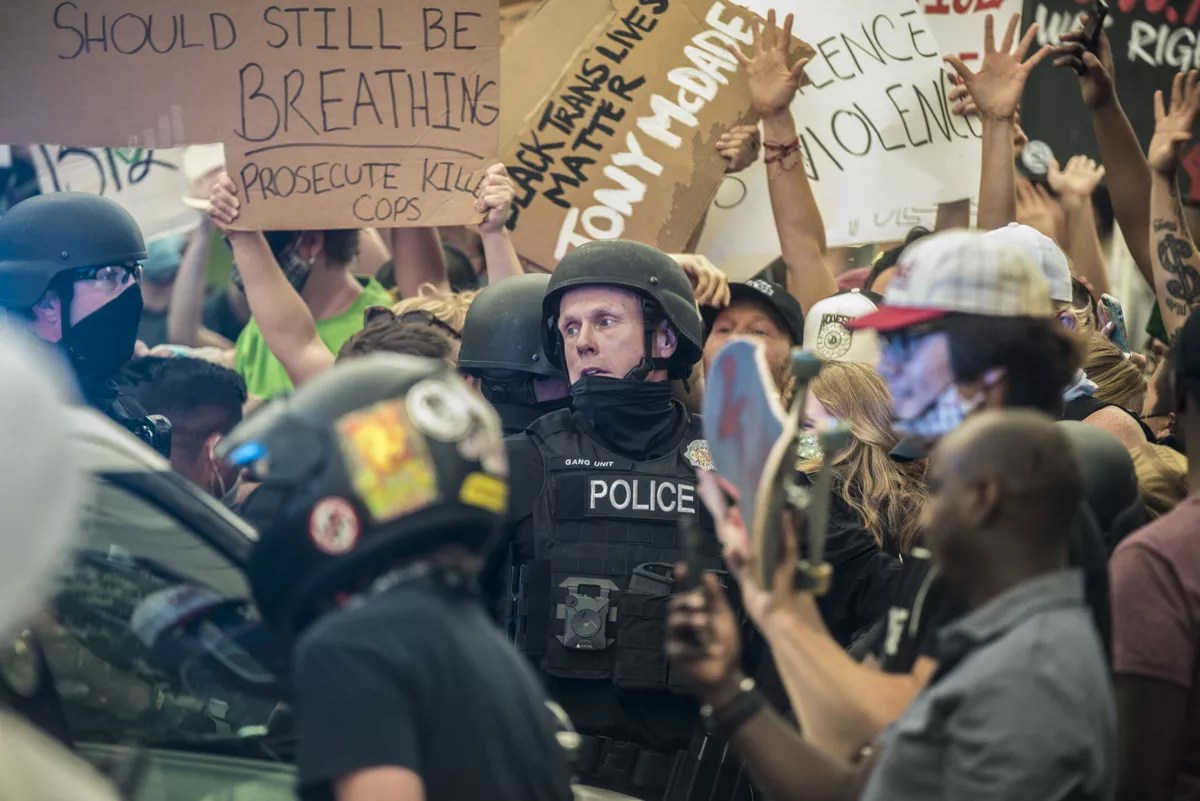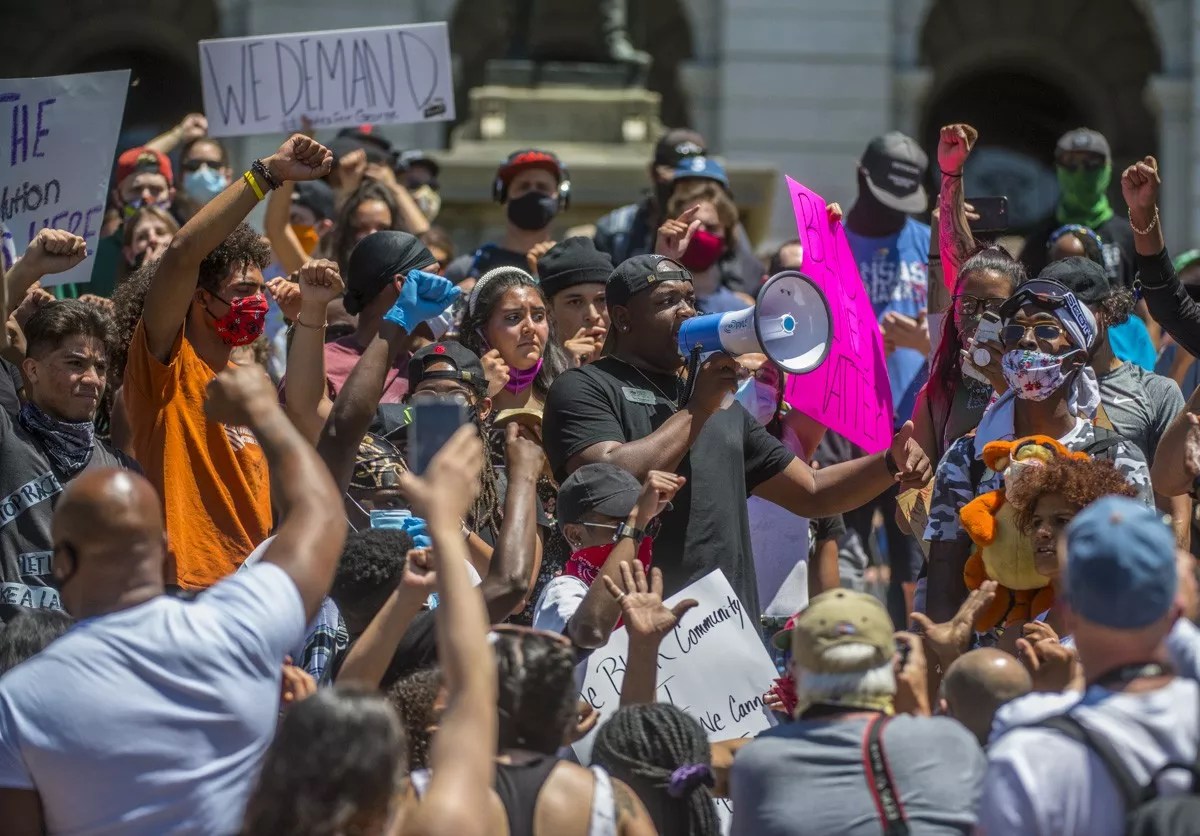
Evan Semon Photography

Audio By Carbonatix
Their city gripped by protests over police brutality, some of Denver’s elected officials are taking action to fend off future problems between the public and local law enforcement.
“Those were our students on the front lines who were tear-gassed and shot at,” says Tay Anderson, who was elected to the Denver School Board last November and is a leader at the downtown rallies, where protesters were dispersed by police using “less lethal” methods. “They weren’t causing trouble. I saw it with my own eyes.”
Anderson now wants to cut ties between Denver Public Schools and the Denver Police Department. The 21-year-old Denver high school alum, together with school board vice president Jennifer Bacon and fellow school board member Scott Baldermann, is pressing DPS Superintendent Susana Cordova to end the contract between the district and the DPD that places law enforcement officers in schools.
Some criminal-justice reform advocates, such as Padres & Jóvenes Unidos, have been pushing for years to get police out of schools and replace them with counselors.
“School policing is the cause of deep racial harms. Black students in DPS are almost 2.5 times more likely to be ticketed or arrested in school as white students. Latinx students are nearly twice as likely to be ticketed or arrested as white students,” says Elsa Bañuelos, executive director of Padres & Jóvenes Unidos.
The current protests have propelled Anderson into action. “As a black man in America,” he says, “this certainly does come out of a place of emotion in wanting our schools to be safe and not ground zero for the school-to-prison pipeline.”
The Denver Police Department currently provides eighteen school resource officers for DPS; the district paid the department $721,403.84 for its services in fiscal year 2019.
With the money saved from cutting the contract, Anderson wants to hire more nurses to help test students for COVID-19 when they return to school, as well as provide more mental health and restorative-justice resources.
The three school board members hope to bring their proposal to a vote at the June 11 board meeting, since there won’t be another meeting until August. They need at least one more supporter to make the initiative a reality.
“We expect boardmembers to bring a resolution before the full Board of Education. We hope to have conversations with educators, families and community members about the issue,” says Winna Maclaren, a spokesperson for the school district.

Tay Anderson addressing a rally at the Colorado Capitol.
Evan Sem
Denver City Council members are also voicing strong concerns about how police have been dispersing protesters using tear gas and pepper-spray balls. Councilwoman Candi CdeBaca is working on a proposal that would ban the department’s use of these types of crowd-dispersal munitions.
“It just doesn’t make sense,” CdeBaca says. “I’ve been at these marches day after day and have experienced the tear gas myself. In the middle of a pandemic, to just abuse the use of tear gas, of these chemical weapons, when you know that you’re causing people to cough, you’re causing irritation of potentially very vulnerable and very sick people, you’re spreading illness – it doesn’t make a lot of sense.”
At the June 4 council meeting – postponed from June 1 because of the protests outside the Denver City and County Building – a handful of councilmembers spoke out against systemic racism in policing and suggested diverting money from the DPD to other areas.
“If that looks like defunding the Denver Police Department to create more community structures, to save people’s lives, I’m right there,” said Councilwoman Stacie Gilmore, adding that her constituents should “vote me out of office if I’m not going to do whatever I can to save black lives.”
Although the mayor actually sets the budget and council only has the power to approve or reject it, even before the protests, Councilwoman Robin Kniech was pushing a bill that would send an initiative to voters asking them to give council authority to “spend new, unanticipated revenue” or excess funds mid-year, unless they are already contractually obligated or voter-designated.
Although she says she’s still researching the issue, Kniech believes that her proposal could theoretically allow council to transfer unspent money in a fund for DPD equipment like tear gas to something like halfway houses. And she’s sure that the “budget amendment would allow for council to proactively fund priorities, such as alternatives to policing, diversion, should we agree to those things as priorities.”
CdeBaca, who says she believes that Denver has finally “reached a boiling point,” definitely wants some law enforcement funds redirected.
“I’m hoping that we will see a shift, we will see some resources diverted from these bloated budgets for the militarization of our communities,” she says. “Moving it toward our needs: mental health, housing – all of the things that go neglected and fall by the wayside and are really at the root of what we need.”
On the state level, two representatives from Denver – Leslie Herod and Serena Gonzales-Gutierrez – are the prime sponsors of a sweeping law enforcement reform bill.
Introduced on June 3, Senate Bill 217 would implement a series of statewide regulations for law enforcement, including a requirement that all officers wear and activate body cameras when interacting with the public; any recording of an incident between an officer and a member of the public would have to be released within fourteen days.
“We have scenarios that need to be addressed. I think, for me, time is up for these recurring scenarios happening on film,” Senator Rhonda Fields, a Democrat from Aurora, said at the June 4 committee meeting on the bill, which she’s also sponsoring.
The bill is getting pushback from members of the law enforcement community, who say it is too sweeping and would punish cops acting in good faith. Lawmakers are already looking at amendments that would address those criticisms.
But there are certain parts of the bill, which directly address what happened to George Floyd at the hands of Minneapolis police, that will almost certainly remain unchanged. For example, one section of the measure would require a law enforcement agency to fire any officer who pleads guilty to or is convicted of any “inappropriate use of physical force or a crime involving the unlawful use or threatened use of physical force, or for failing to intervene to prevent inappropriate use of physical force.” An officer fired for any of these reasons would then be effectively banned from any law enforcement job elsewhere in the state.
The legislation would also eliminate the fleeing-felon statute, which allows an officer to use deadly force on someone running away when an officer believes that person “has committed or attempted to commit a felony involving or threatening the use of a deadly weapon.” This statute was used as justification for the police shooting and killing of De’Von Bailey in Colorado Springs in August 2019. And Senate Bill 217 seeks to ban the use of chokeholds by law enforcement officers as well.
Kniech points out that Denver’s 2018 police use-of-force policy, which outlines the “less lethal” methods that the DPD has been employing at the protests, already bans chokeholds unless used during a lethal-force encounter. The policy also requires officers to intervene to prevent unnecessary use of physical force.
But while the text of that policy may cover certain scenarios, the police department can still work on “training, implementation and accountability,” Kniech says.
“We are all accountable.”